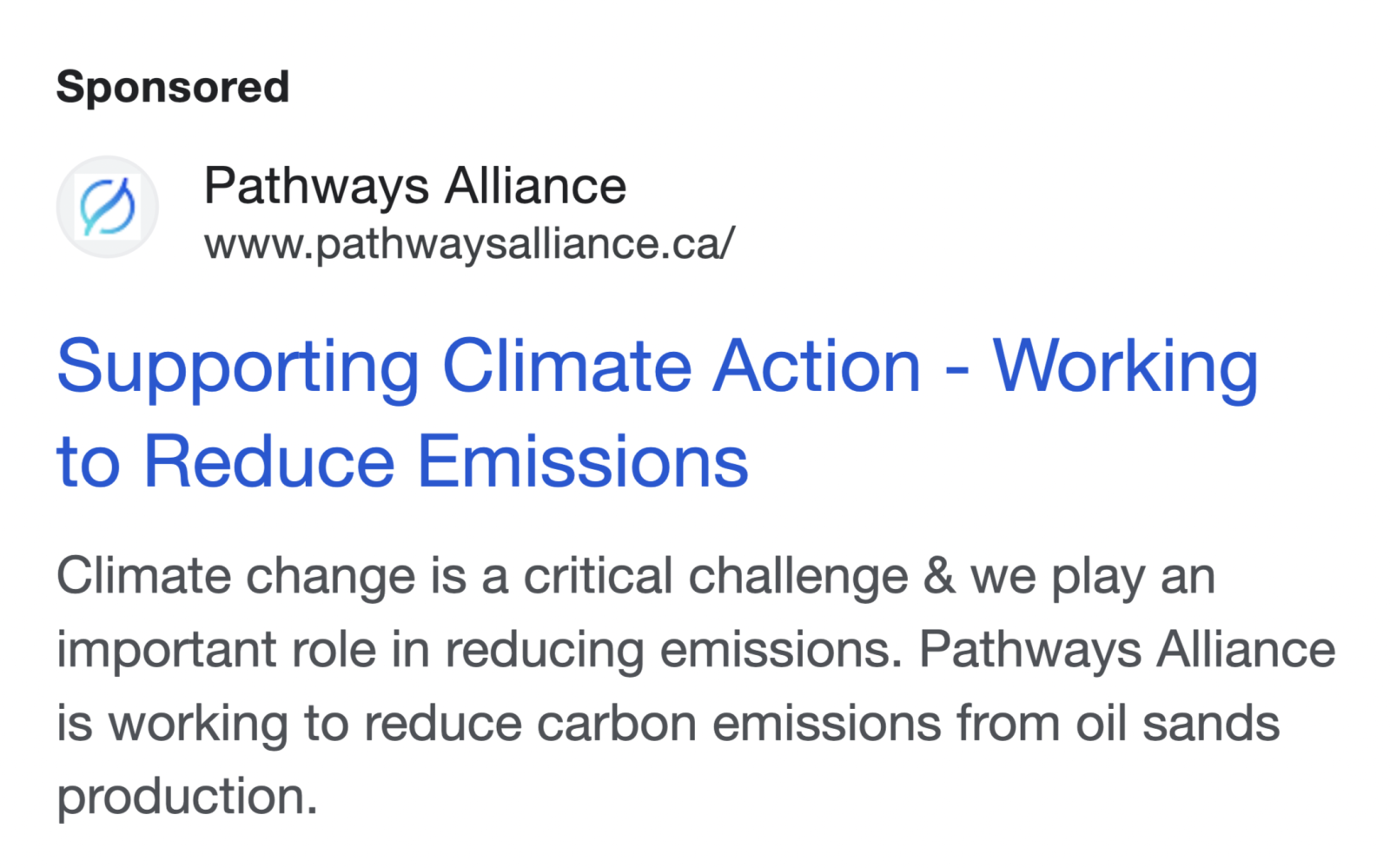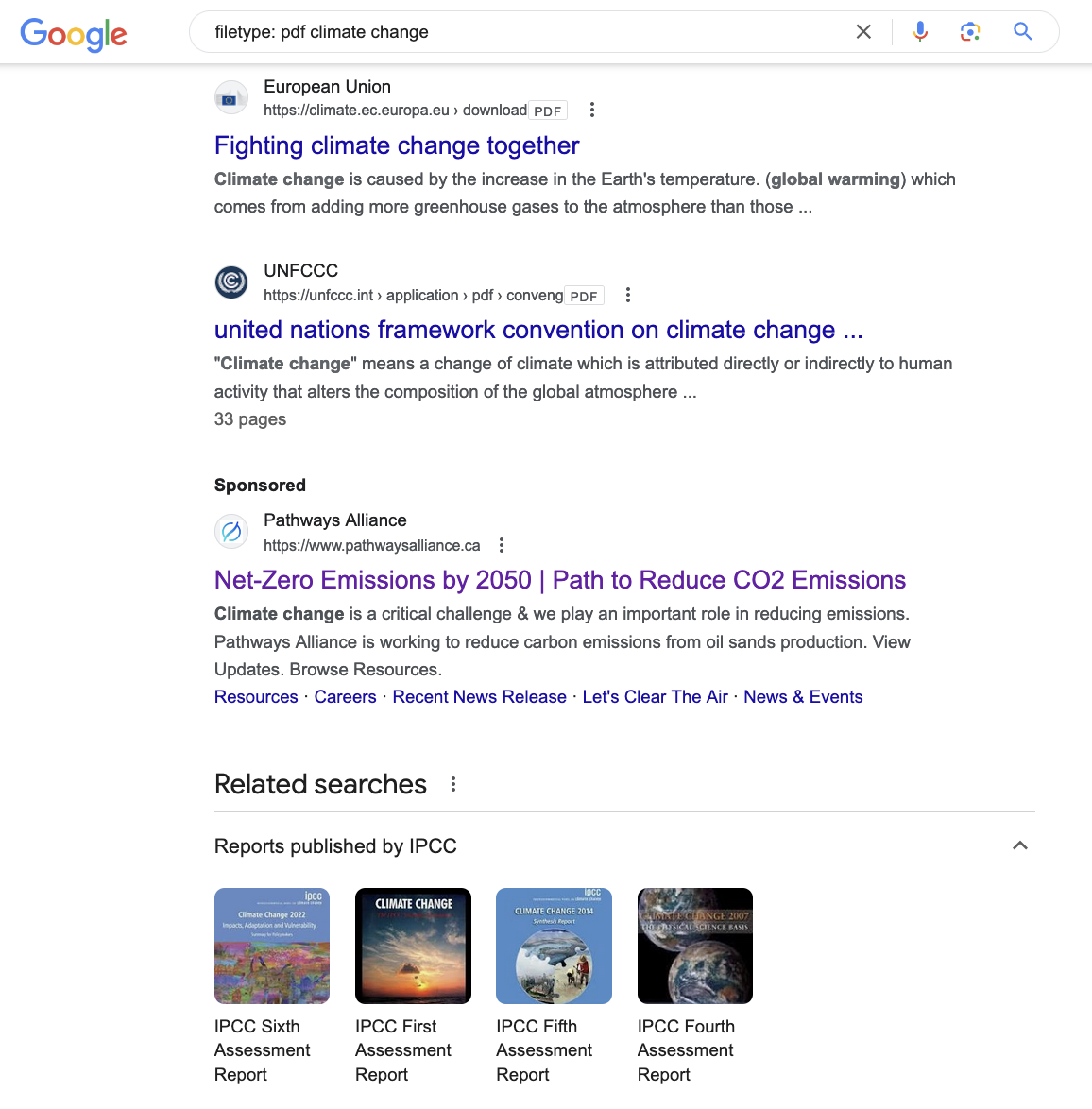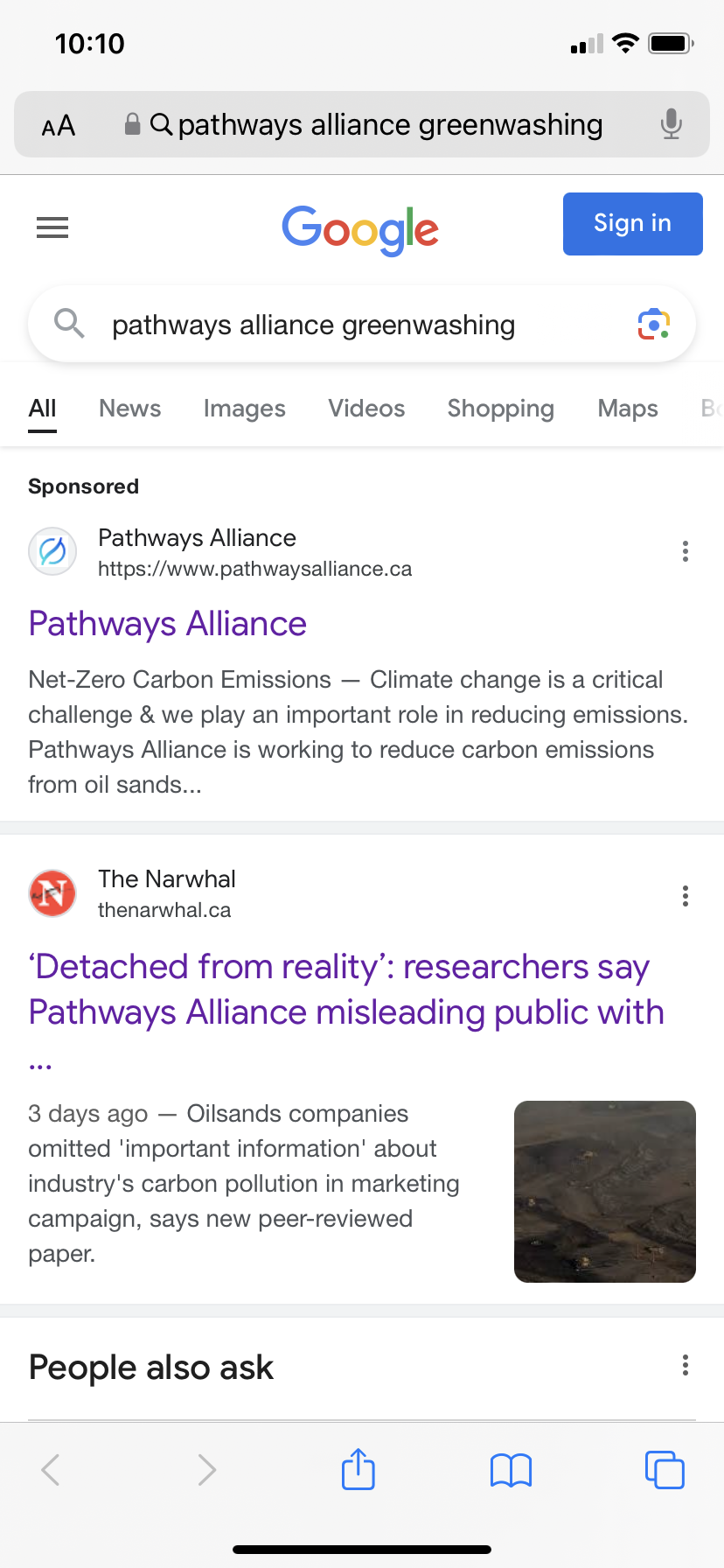Articles Menu

Apr, 12, 2024
When we are confused about carbon taxes or other climate policies, we often turn to Google for help. Some of us Google Search for information on “climate payment” or “climate action incentive payment” or "carbon tax rebate." Others seek government sources by searching “Environment and Climate Change Canada” or “net zero.” A few use special operators for searches, like “filetype:pdf climate change,” to filter for climate reports in PDF format.
For these Google Searches, the initial results were often from oilsands behemoth Pathways Alliance, an organization of six companies accounting for 95 per cent of production in a sector whose carbon emissions have spiked immensely over the last two decades. This is sponsored content, paid for by an organization already under investigation for greenwashing, to put the oilsands perspective at the forefront of climate debates. The content consists of digital advertisements that claim oilsands companies are supporting climate action, reducing carbon emissions and working towards net zero by 2050. The top search results on Google are the ones people use to form opinions on things like carbon taxes, energy options or anything, really.


These are among the hundreds of search keywords purchased by Pathways Alliance to direct those curious about climate change to oilsands content — schoolchildren doing their homework, cash-strapped farmers trying to understand carbon taxes or voters interested in Alberta Premier Danielle Smith. On these and other climate subjects, but especially carbon taxes and net zero, oilsands companies paid Google so you hear from them first.
We stumbled across these ads while assessing Pathways Alliance’s conventional advertising for evidence of greenwashing. Yet, we found no openly available data on these keywords — the untraceability of this content reminds us of “dark posts” that are designed to influence elections with disinformation while evading public awareness.
According to its Ad Transparency Centre, Google is dynamically generating content for Pathways Alliance, and a Google Premier Partner is purchasing the ads for them. But reliable data over time is not available to public users. Google Premier Partners are agencies that excel in using Google’s ad technology and search engine optimization to maximize campaign success for clients. It is impossible to determine the role played by artificial intelligence (AI) in these efforts, but Google’s celebration of AI-powered ad solutions, which includes optimizing bids and making search ads “responsive,” makes the question worth asking.
Canadians must have undistorted search results on climate policy when conducting Google searches, write Chris Russill, Patrick McCurdy and Jenny Kliever. X
Given its lack of public traceability, this content isn’t accounted for in complaints about fossil fuel greenwashing or in discussions of Bill C-372 on fossil fuel advertising or in the Competition Bureau commissioner’s request for better tools to fight deception.
These ads are part of a wider PR campaign that made 1.5 billion impressions for Pathways Alliance in 2023 (an impression is a person’s exposure to promotional content). That’s a lot in a country of less than 40 million people. And these ad impressions are part of a still broader influence campaign by Pathways Alliance.
Our research identified numerous indicators of greenwashing in Pathways Alliance’s public-facing communications, including promotion of its net-zero plan. Yet, the sponsorship agreements with news media, lobbying of government, collaboration with Google and exchange of information with financial institutions are all exterior to how investigations of greenwashing in Canada are currently undertaken. The role of Google in generating content, tracking users and optimizing influence efforts with AI tools seems completely missing from current discussions.
We think about greenwashing in an outdated fashion, one that isn’t equipped for an industrial sector operating at this scale. If the CEOs of Google, Facebook, Apple, Amazon, Microsoft and TikTok met weekly to strategically co-ordinate efforts to reshape Canadian public opinion, as Pathways Alliance has done, it would invite objections. Yet, we approach this issue like it is the 1990s when lone companies exaggerated environmental commitments in glossy magazines or morning newspapers to gain a competitive edge. We investigate deceptive practices by focusing narrowly on consumer purchasing and take years to reach a decision while misleading and false claims go unchecked. We propose legislation as if oilsands companies in the 2020s are paging through tobacco company playbooks from the 1970s, and as if the scale, secretiveness and science of influence are unchanged by Google’s transformation of advertising, the use of AI or an unprecedented degree of strategic co-ordination among oil producers intent on reshaping Canada’s climate conversation around its own needs.
Greenwashing, like political influence during elections, is now an economy, not an incidental infraction, and its use by fossil fuel industries during the energy transition has exploded in scope and significance, confusing public opinion and generating wider distrust in the integrity of climate and energy policy. It is not about influencing consumer purchasing but, as noted by an RBC report on Pathways Alliance’s plans, “maintaining a social licence to operate and thrive.” The net-zero and climate action claims of Pathways Alliance are intended for this purpose but are not tested, not substantiated, not validated and given current competition and social media policies covering greenwashing, need not be.
This must change.
The promises of fossil fuel companies to climate action should be supported by substantiation that is visible to all, not hidden behind non-disclosure agreements, especially when tens — if not hundreds — of billions of dollars in government assistance is requested for net-zero plans lacking basic credibility. This “reverse onus” provision, or the need of companies to validate claims to climate protection, would make public debate more fact-based and fair while providing competition authorities a tool they badly need. We should demand this of the creators of fossil fuel ad content, as well, including news outlets helping generate native advertising or sponsored content from the fossil fuel sector. Google’s claims to confront climate change head-on are meaningless if it generates and displays misleading claims to climate action for oil companies.
The request for truth might seem quixotic given the scale of the problem and the actors involved. But this isn’t about fact-checking or asking for receipts. It is about affirming that Canadians have undistorted search results on climate policy. It is about affirming desires for a fair debate by confronting the cynicism of permitting Big Oil and Big Tech to bend the nation’s climate conversation to their needs. It is about finding pathways to net zero we can trust and verify together.
Unfortunately, Pathways Alliance has responded to these concerns with still more ads — now buying Google Searches of “pathways alliance greenwashing.”

It is time to insist that separating fact from fiction is a climate solution and, beyond that, remains integral to who we are as a people.
Chris Russill is an associate professor in the School of Journalism and Communication and an academic director at Re.Climate, a centre for climate communication and public engagement, both housed at Carleton University in Ottawa. He is a co-author of the first academic study on net-zero greenwashing in Canada with Melissa Aronczyk and Patrick McCurdy.
Patrick McCurdy (PhD) is an associate professor in the Department of Communication at the University of Ottawa. His research uses communication and social theory to study media as a site and source of social struggle. Since 2014, he has focused on the polarized debate over the Athabasca oilsands. In April, together with Chris Russill, he received an Insight Grant from SSHRC for a four-year research project titled, "Greenwashing and the Energy Transition: A Framework for Assessing Net Zero Communication in the Canadian Oil Sands Sector.”
Jenny Kliever is a PhD student in the School of Journalism and Communication at Carleton University. She holds a bachelor of science in physics and a master's in science communication and uses a multidisciplinary approach to study science as a phenomenon that plays out within particular social, political and cultural contexts. She has previously worked at the University of Toronto Atmospheric Observatory, measuring urban pollution, and is currently a researcher with Re.Climate, studying digital advertisements by Canadian oilsands companies.
[Top photo: We need to get to the bottom of fossil fuel greenwashing people encounter when conducting searches on Google. Photo by fotdmike/Flickr (CC BY-NC-ND 2.0 DEED)]